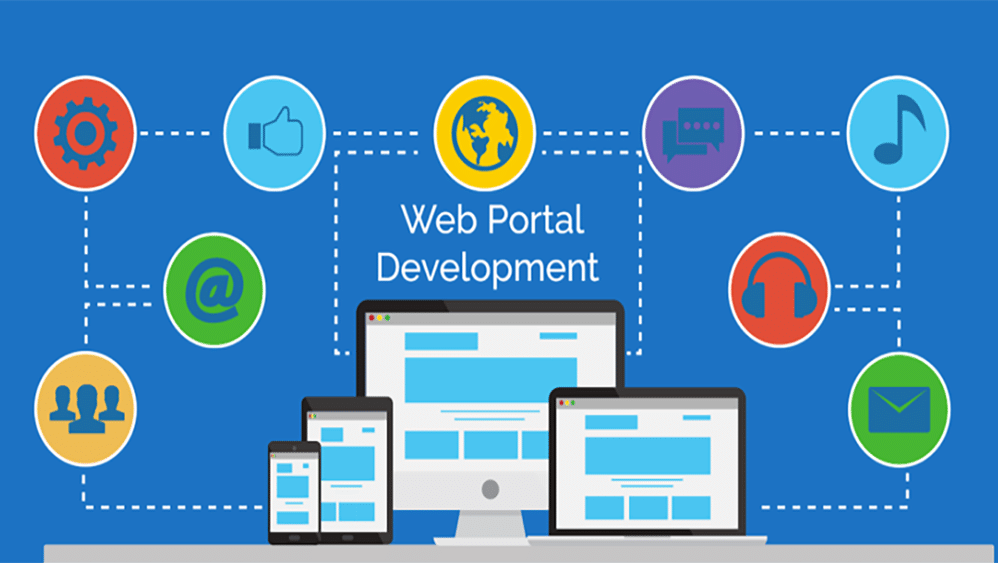
Web portals facilitate communication, augment security, and promote innovation to enhance business growth and elevate client satisfaction.
In this highly competitive market, customer and employee satisfaction and loyalty are essential for any company seeking long-term success. Offering users continuous access to their account information, orders, bills, and more resources via a web portal can significantly enhance satisfaction, cultivate trust, promote loyalty, and augment the value of your business. The advantages of web portals have enabled organizations to transform their communication and operational methods with clients and employees. Understanding web portals can be beneficial for business owners aiming to increase client experiences or organizations seeking greater internal communication. A Web portal assists enterprises, organizations, and communities in combining diverse experiences, services, and information into a singular location. The popularity of online portals is expected to increase; for example, according to the Data Intelo research, the web portal market could grow at a CAGR of 10% by 2028.
Web Portals: A Unified Solution for Business Success
A web portal is an online platform that functions as an access point for users to navigate diverse material, encompassing corporate information, products, and services. Companies deploy web portals for multiple goals, including sharing information, sales facilitation, and collaborative spaces. Web portals are designed for direct access, enabling the transmission, storage, playback, communication, or utilization of various data types through an easily navigable interactive user interface. It is a systematic approach to customizing the way you use data. It is significantly more efficient and mitigates additional difficulties. Contemporary businesses extensively utilize web portal development to strategize, engage, and execute a fully secured service that facilitates connections in user-friendly digital environments. Customers, employees, partners, clients, and staff can utilize it for various activities in a modernized menner. Professionally built portals are frequently used by firms and organizations to proactively adapt to market dynamics and fulfill customer requests.
Why Web Portals Matter: Features and Benefits You Need to Know
Effortless Team Collaboration with a Web Portal
An employee frequently transmits documents or other data to a colleague during the day. To avoid additional work and time, a web portal for seamless information exchange is required. Centralized data enables users to access all information in one location, with the capability to distribute across numerous channels. With secure sharing, users may share documents without hesitation.
Building Stronger Customer Relationships via Web Portals
Customers benefit from a more advanced way to communicate with businesses and organizations by obtaining faster updates and notifications for any queries, orders, cancellations, wish lists, or other difficulties that may arise throughout their online experience. Client portals save a lot of time compared to traditional methods, because self-help works well for digital interactions. Multiple and unending questions are addressed in minutes with no human intervention, saving time and effort.
HPE (Hewlett Packard Enterprise), serving over 650,000 clients across 174 countries, once struggled to deliver appropriate data to its clients and partners. To address this issue, a new HP partner web portal was developed, recognized as one of the finest web portal models.
Accelerating Production and Innovation with Web Portals
Manually managing production and associated information is always complicated; however, a structured central data interface offered by a web portal facilitates the efficient management, arrangement, editing, and formatting of data inside the firm through access via an admin URL or password. Conventional emails and other storage methods can be challenging, prompting the adoption of portals to facilitate more efficient innovation.
Enhancing Business Performance and Reach
Various types of web portals are tailored for B2B and B2C models, offering growth reports and insights on areas that require modification for enhancement and improvement. While there is no significant statistical difference, a comparable viewpoint is presented, allowing consumers to comprehend and influence business progress. Enhancing and adapting digital technologies can effectively trace competitiveness and market reach, fostering harmony in the working environment.
Elevating Security with Web Portal
Maintaining several access points complicates the enforcement of security measures like end-to-end encryption. A unified, organized web portal enhances safety for both businesses and customers. Modification, deletion, or any basic access falls under security policies. Managing and maintaining several web apps is more challenging and costly. A web portal can serve as a cohesive gateway for all digital interactions and access required by a company seeking to streamline its expansion and client relations.
Web Portal Examples
E-Health Web Portals
Patient web portals are intended to offer patients secure access to their healthcare information (appointments, test results, medical history, etc.) and facilitate communication with health and social care providers, including doctors, clinics, and hospitals. The most wanted features of patient portals include appointment scheduling, medical history access, messaging, and medication updates. Doctor portals serve as digital platforms that provide healthcare practitioners with essential current information regarding their patients and practice management. It is frequently incorporated into a comprehensive healthcare management system that integrates web-based EHR (EMR) and practice management capabilities.
Corporate Web Portal
A corporate portal, also known as an enterprise portal or business portal, is a secure platform that allows corporations to manage massive amounts of data. Although corporate portals share certain features with employee web and consumer portals, they serve a greater purpose as a crucial information and communication hub for employees, partners, and stakeholders. Individuals using corporate portals have access to the data, tools, and resources they require for their work and cooperation. This is also an appropriate location to host online classes, resources, and assessments to improve staff skills and knowledge.
E-commerce Portals
B2B and B2C e-commerce portals are developed to enhance and expedite communication and transactions between vendors and consumers. These portals are included in the company’s digital infrastructure and supply chain process, functioning as tools for sales, marketing, and customer/client support. A B2B e-commerce portal is a self-service platform that enables businesses to efficiently order items and manage connections with vendors and partners in a centralized location. B2C portals give users a variety of beneficial features that enhance retention and optimize the user experience, including user accounts, order history, rewards management, e-wallets, customized content, promotions, and discount programs.
Conclusion
Web portals are revolutionizing the manner in which organizations engage with clients as well as employees. By consolidating data and optimizing communication, they provide a robust instrument for promoting growth, loyalty, and operational efficiency. They enhance internal and external communication, bolster security, and facilitate increased customer and staff satisfaction, so fostering sustainable success.




